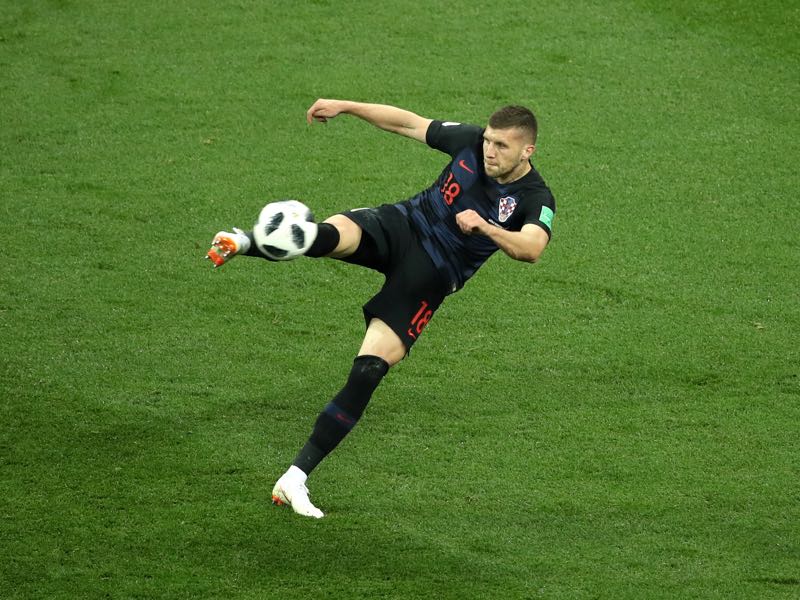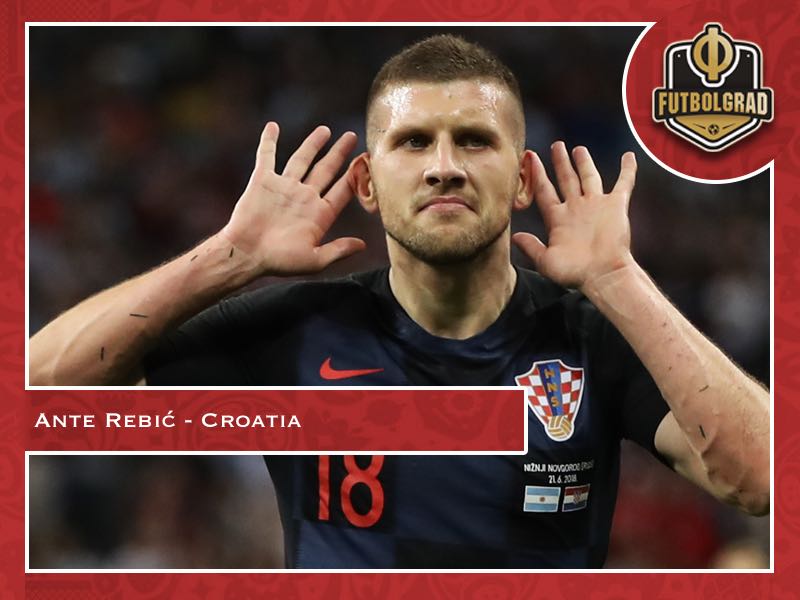Manuel Veth reporting from Sochi –
Ante Rebić was off to races. Nothing could stop him now as he was pacing towards Bayern München’s goal to score his second goal of the night and in essence, pave the way for Eintracht Frankfurt’s first title in 30 years. Hence, when the 24-year-old Croat had capped off his run and put the ball past Bayern keeper Sven Ulreich, he kept on running towards the Frankfurt fans, who were in complete ecstasy at this point.
Even a quick VAR review could not dampen the atmosphere. Rebić’s goal stood, and Eintracht would later add a third to win the title. The goal and the title capped off an excellent club season for Rebić, who just last summer was signed almost as an afterthought by Eintracht – the Croat forward had been on loan the previous year, and Frankfurt only signed him once again after Fiorentina significantly reduced their demands.
The forward, however, had an excellent season scoring six goals and three assists in 25 games for Frankfurt. But it is not just the goals and the assists that made him valuable. Rebić added that little bit extra to Frankfurt’s attack – explosiveness and edge that could seldom be matched by opposing centre-backs making him a threat in a way that cannot be accounted for by hard data.
Ante Rebić from bargain buy to key asset
As a result, his transfer value exploded from €2.5 million to €10 million – making it easy for Frankfurt sporting director Fredi Bobic to activate Rebić’s €2 million clause to make the loan move a permanent transfer. With this in mind, it was hard to imagine that Rebić could top his season in any way.
The Croat had won the DFB Pokal in Germany and was now linked with top clubs – including Bayern München where his Eintracht Frankfurt head coach Niko Kovac had signed this summer. “Rebić would look good on any team”, Niko Kovac has told Goal.
“It is hard to say no when a club like Bayern come knocking”, Rebić has responded to the rumours. “But for now I am not thinking about a move”, he quickly added.
Perhaps the most remarkable about the rumour is that Rebić is targeted by a club like Bayern at all. Just a year ago Rebić was sent back to Fiorentina after a one-year loan to Frankfurt. Not efficient enough and too troublesome was the judgement by Eintracht’s decision makers.
Only after Rebić failed to find a new club and Fiorentina decided to lower their demands did Frankfurt resign the Croat. A one-year deal with a €2 million exit clause was agreed upon. That deal now looks like a bargain given everything that happened in the last year.
Rebić has forced his way into the Croatia squad
Rebić’s rise to a top Bundesliga player has also meant that he was included in Croatia’s World Cup squad. There, however, he was almost treated like an afterthought among the many talented forwards the Vatreni had to their disposal.
Sure Rebić showed his talent in the Bundesliga. But the likes of Mario Mandžukić, Andrej Kramarić and Ivan Perišić. Furthermore, with Luka Modrić expected to play further up the chances for Rebić to shine were expected to be small.
Croatia head coach Zlatko Dalić, however, valued Rebić’s pace on the wing and his ability to threaten defensive lines with aggressive attacking runs. As a result, Rebić started against both Nigeria and Argentina.

Ante Rebić of Croatia scores his team’s first goal during the 2018 FIFA World Cup Russia group D match between Argentina and Croatia at Nizhny Novgorod Stadium on June 21, 2018 in Nizhny Novgorod, Russia. (Photo by Clive Mason/Getty Images)
Against Argentina, he would open the scoring with a fantastic goal after a horrendous mistake by Argentina goalkeeper Willy Caballero. Dropping the ball right in front of Rebić the forward only hesitated for a split second before sending the ball home with a wonderful volley that despite Cabellero’s mistake was difficult to complete.
He was then rested against Iceland but has since played both in the round of 16 and in the quarterfinals. The 24-year-old then played 120 minutes against both Denmark and Russia.
Neither game was the sort of performance in which forwards were allowed to shine. Denmark and Russia followed the same strategy – try to break down the Vatreni. Croatia, however, have many tools to their disposal – while they are a great technical side they can also put up their sleeves and battle teams that want to take a physical game to them.
It is all about the work rate
Here Rebić shined in both matches. Let us take the game against Russia as an example. Ante Rebić was second only to Luka Modrić in overall dribbles throughout the 120 minutes. Continually trying to threaten Russia’s backline, which had once again impressed by outrunning their opponents, Rebić was mostly defined by his work rate rather than his attacking prowess in the match.
It is the sort of work rate he learned from his former head coach Niko Kovac. At Frankfurt forwards were often asked to be the first defensive line. Frankfurt was all about hard work last season and the ability to create that special moment even when the tank was empty.
That has also defined Rebić at this tournament even if he had only one glorious moment thus far. But against England Rebić will once again be asked to put in the hard work, just to be ready for that one moment that can make all the difference and send Croatia to their first ever World Cup final and without a doubt pave the way for Rebić to seal a transfer to a world-class club.
Manuel Veth is the owner and Editor in Chief of the Futbolgrad Network. He also works as a freelance journalist and among others works for the Bundesliga and Pro Soccer USA. He holds a Doctorate of Philosophy in History from King’s College London, and his thesis is titled: “Selling the People’s Game: Football’s transition from Communism to Capitalism in the Soviet Union and its Successor States,” which is available HERE. Originally from Munich, Manuel has lived in Amsterdam, Kyiv, Moscow, Tbilisi, London, and currently is located in Victoria BC, Canada. Follow Manuel on Twitter @ManuelVeth.




















COMMENTS